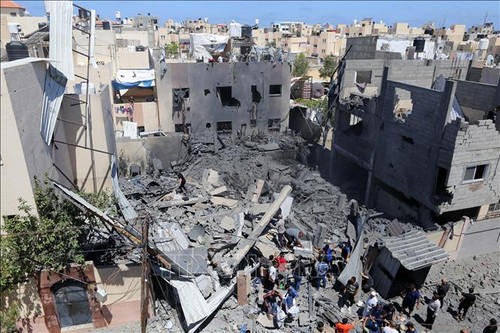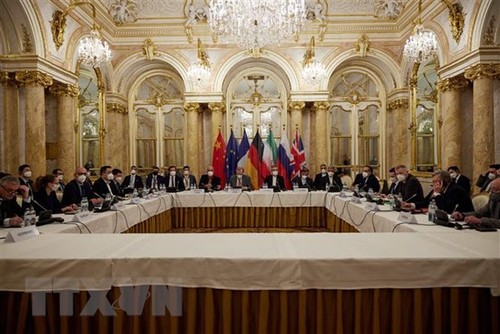 Houses are destroyed after a series of Israeli air strikes on the city of Khan Younis, Gaza Strip, May 19, 2021. Photo: Xinhua/VNA Houses are destroyed after a series of Israeli air strikes on the city of Khan Younis, Gaza Strip, May 19, 2021. Photo: Xinhua/VNA
|
Hotbeds
Violence continued in the Palestinian territories, especially the West Bank, and the number of Palestinian deaths in 2021 was three times higher than in 2020. The worsening Palestinian-Israeli conflict indicates that peace is still just a dream for both Palestinians and Israelis as it has been for decades.
It is not just the Palestinian-Israeli reconciliation process that has reached an impasse. The civil war in Syria, the war in Yemen, instability in Iraq, and Iran nuclear negotiations are stagnant, too. The Syrian civil war is about to enter its 11th year, and a final ceasefire agreement has not yet been reached. Last year, Israel increased its attacks on Syria, making the civil war there even more unstable. The war in impoverished Yemen has no end in sight, as frequent fighting has been reported between government troops backed by Arab countries and the Al Houthi Muslim rebels. Hostilities have increased lately, with the Saudi-led coalition launching a large-scale offensive against the Al Houthi forces on January 11.
Meanwhile, negotiations to restore the Iran nuclear deal, officially known as the Joint Comprehensive Plan of Action (JCPOA), signed in 2015 between Iran and six major powers, have produced no breakthrough, although multiple rounds of talks have been held in Vienna, since last April. The disagreement between the US and Iran remains the biggest barrier. In Iraq, a neighbor of Iran, insecurity challenges national reconstruction as the terrorist Islamic State organization continues its lethal attacks against security forces, foreign targets, and Iraqi government agencies. Iraqi politics have been turbulent following a controversial general election in October.
 Delegates attend a round of negotiations to restore the Iran nuclear deal, Vienna, Austria, December 27, 2021. Photo: AFP/VNA Delegates attend a round of negotiations to restore the Iran nuclear deal, Vienna, Austria, December 27, 2021. Photo: AFP/VNA
|
Effort and hope
Analysts attribute the lack of peace progress to a number of reasons. First of all, they say it’s difficult to find consensus when hatred runs so deep and problems involving so many different parties dragged on for so long. Second, international resources devoted to solving regional problems have been significantly reduced as the world has focused on COVID-19 and major powers have redirected resources to their own interests.
Nonetheless, the Middle East received a lot of attention from the international community last year. The UN Security Council and several countries put forward solutions to the Palestinian-Israeli conflict involving dialogue, reconciliation and non-violence. The UN, the EU, and certain countries pushed Iran nuclear negotiations, conducting eight rounds of negotiations in just eight months. Israel and three Arab countries – the United Arab Emirates (UAE), Bahrain and Morocco – honored peace agreements signed in 2020, radiating a conciliatory mood in the region.